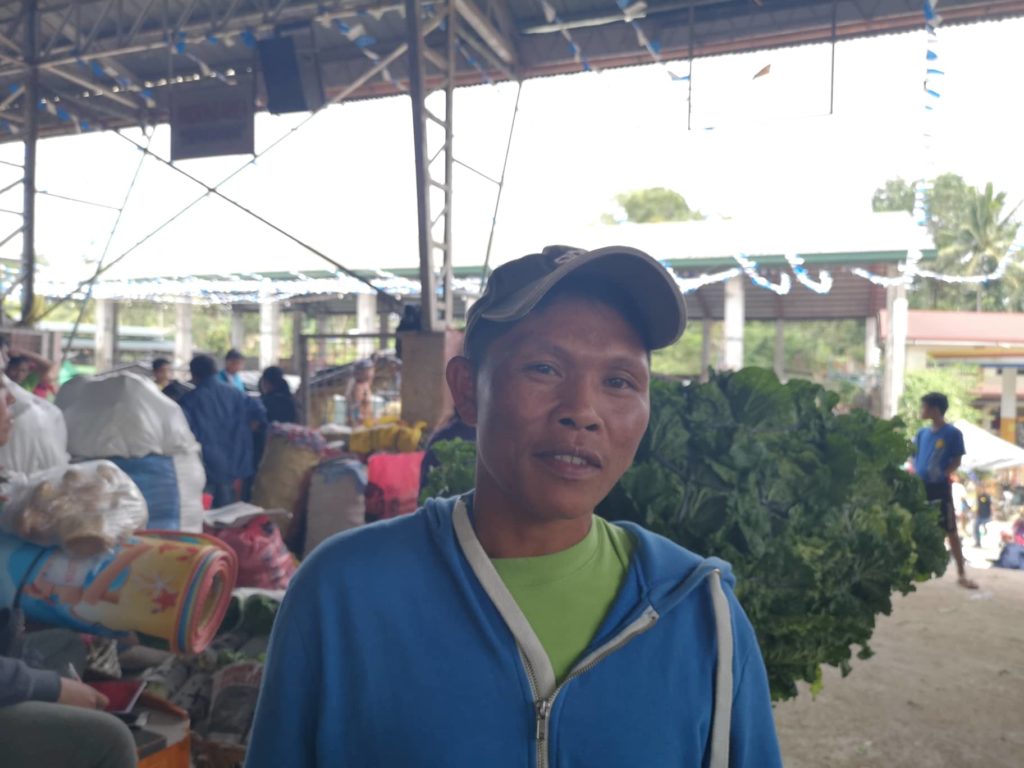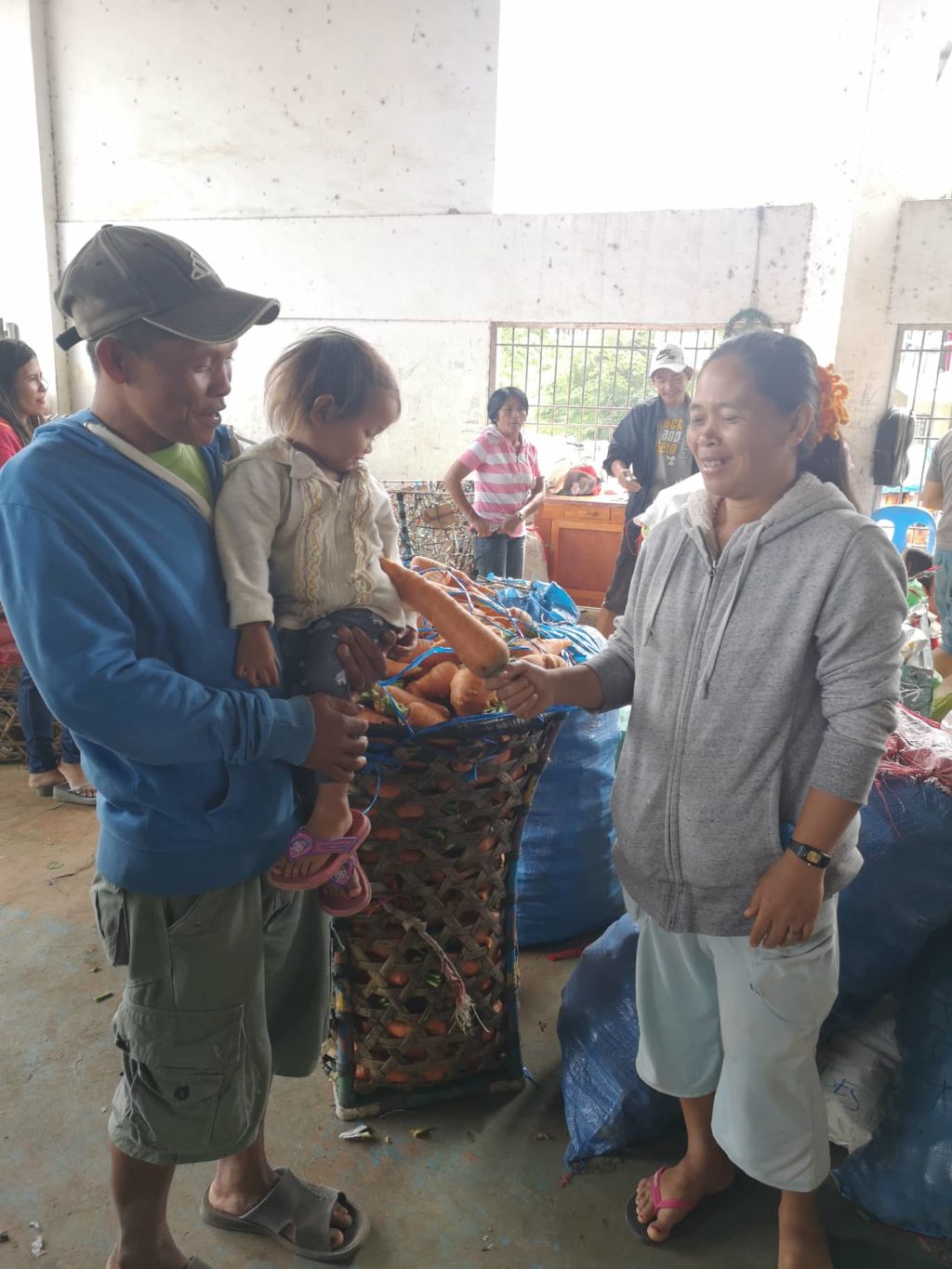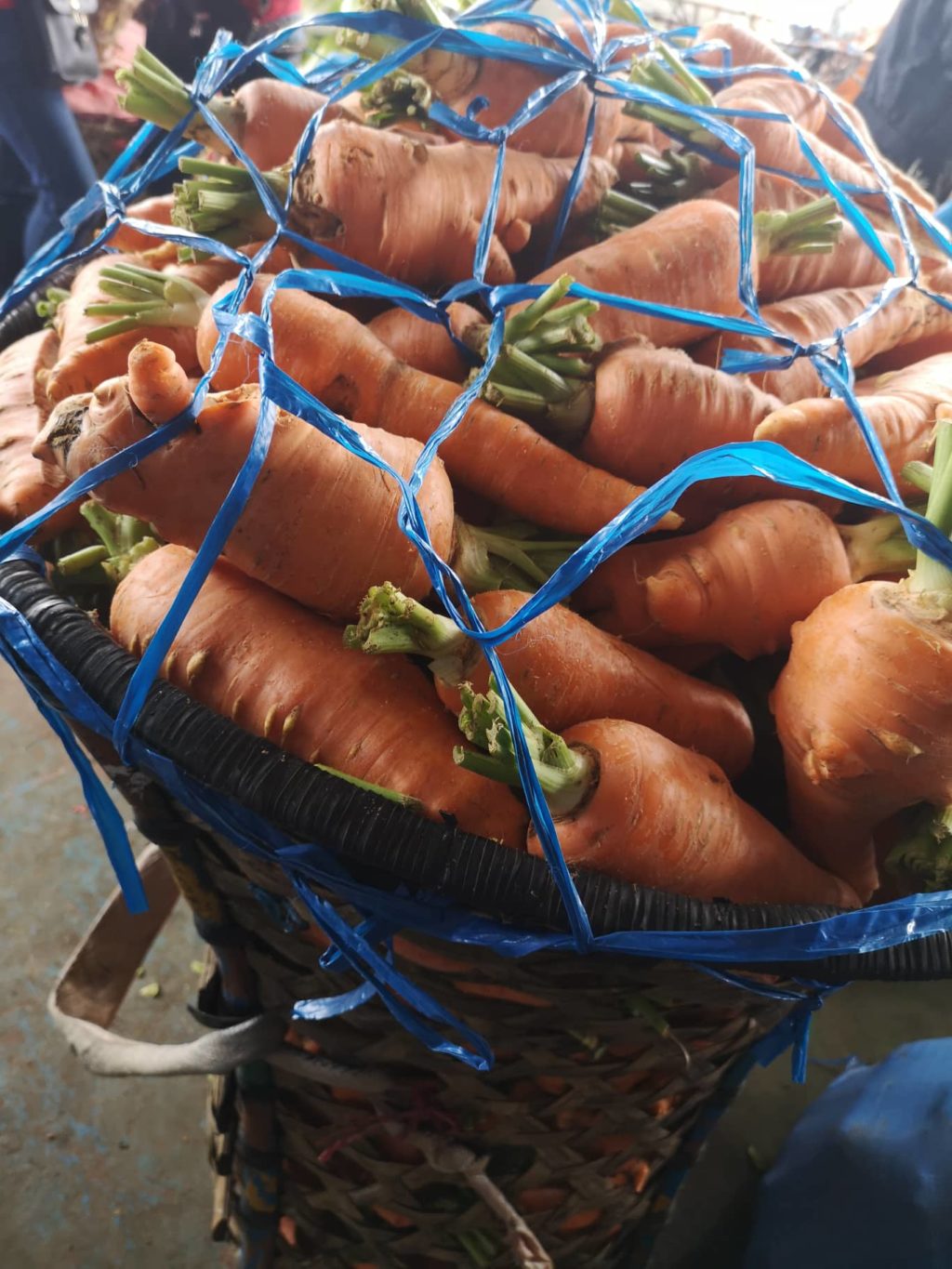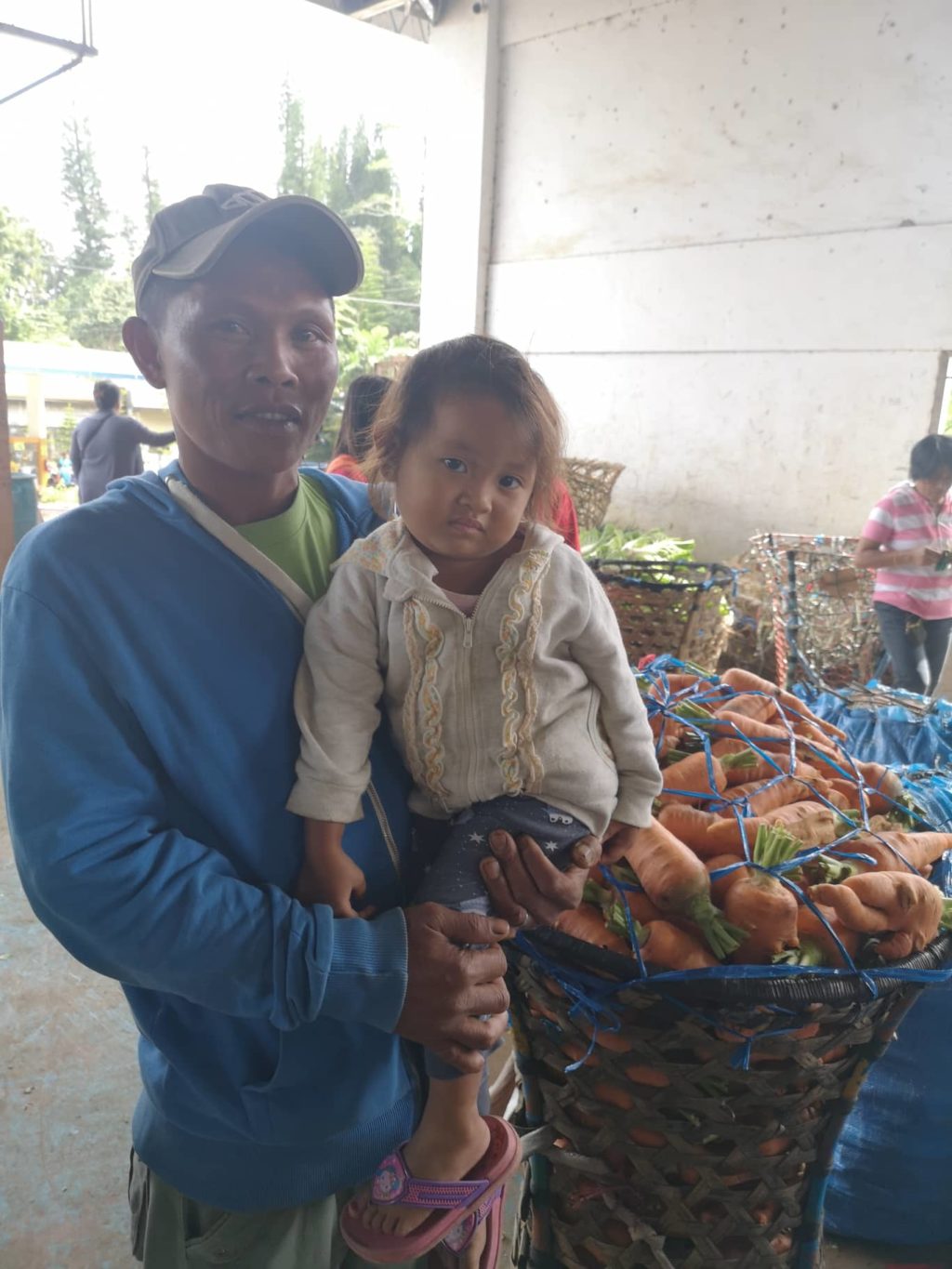A Mantalongon farmer’s Christmas wish, dreams, hopes and challenges

Farmer Cornelio Ybañez brings his produce in the Mantalongon market. | Doris Mae Mondragon
DALAGUETE, CEBU, Philippines — As early as 5 o’clock in the morning, Cornelio Ybañez is already up carrying on his shoulders a bamboo container and a sharp razor “sanggot”(scythe) to collect coconut sap.
After that, he would spend hours to tend to his farm in Barangay Dumalan, a mountain barangay located in Dalaguete, south of Cebu.
Ybañez is growing vegetables like bell pepper, chili and carrots.
At present, he is growing carrots which takes at least three months to mature. During that period, the crops have to be watered, fertilized and should be cleared of side roots.
Ybañez can make three batches of harvest. Considering a good weather, he can harvest at least 400 kilos of carrots per batch.
Christmas wish
The 40-year-old farmer is a multitasker. Ybañez is doing three jobs at the same time—manguma (farming), mananggot (native wine gatherer) and mamanday (carpenter).
Ybañez, a father of seven, said that for him to provide the needs of his growing family, he had to maximize his energy and time.
As someone who wasn’t able to finish his studies, Ybañez said his greatest dream for his children would be for them to finish their studies.
“Importante kaayo ang edukasyon kay lisod kaayo mangita og maayong trabaho kung walay nahoman nga kurso. Ang akong damgo, nga unta makapahoman gyod og paeskwela kay karon ang importante gyod makahoman gyod og kurso,” Ybanez said.
(Having education today is important because it is difficult to get a job if you have not finished any course. My dream is for my children to finish their schooling because it is important for one to complete an educational course.)
“Lisod man gud karon kay og way grado maglisod og pangitag trabaho. Dili sila mopareha sa akoa nga wala makahoman og skwela, wala nakakuha og kurso,” Ybañez said.
(It is difficult today to find a job if you have not educated. I don’t want my children to be like me who had not finished my schooling and have no title or have not completed a course.)

Cornelio Ybañez shares a light moment with his family at the Mantalongon market where they brought their produce of carrots to sell them. | Doris C. Mondragon
At the age of 20, Ybañez was proud to call himself a farmer—a job that was passed on to him by his parents.
Ybañez stopped going to school until his third grade, but he said he was happy to have helped his siblings finish their studies.
“10 mi kabuok magsuon. Mao ray nagbuhi namo, magbaol ug mananggot. Nitabang man ko sa akong mga ginikanan og uma kay kinamaguwanaan man ko nga lalaki,” he said.
(We are 10 siblings in the family and farming and coconut wine gathering were our means of livelihood. So I have to help my parents in the farm because I am the eldest.)
Despite only reaching third grade, Ybañez is grateful that he had helped her younger siblings to finish schooling.
One of them had graduated from an automotive course while another one is a teacher.
When asked what his Christmas wish is, Ybañez simply smiled and looked at his wife.
“Mapasalamaton ko karong pasko kay naa pay dagdagonon nga carrots ug nangayo ko’s Ginooo nga maayo lang ko’g lawas, makatrabaho ko kada adlaw, mao ray akong gipangayo sa Ginoo nga makapa skwela kos akong mga anak, makapakaon nila ka tulo sa usa ka adlaw,” he said.
(I am thankful this Christmas for the bountiful harvest of carrots and I ask the Lord for good health that I can continue to work on the farm so that I can continue to send my children to school and to feed my family three times a day.)
Drop in prices
But having an abundant harvest will not usually result in bigger earnings for the farmers like Ybañez as there are several factors that affects the prices of vegetables like the law of supply and demand and the effects of the weather on their crops.
In Dalaguete town in the past two to three months, the prices of produce in Dalaguete have jumped to the highest level, according to Edmond Limbaga, assistant head of the Dalaguete Agri-Pinoy Trading Center (DAPTC).

The produce that Cornelio Ybañez plans to sell at the Mantalongon market. | Doris Mae Mondragon
But recently, local farmers are facing a steep drop in prices.
“Wala may government intervention sa presyo sa mga utanon. Magbase sila sa demand. Kung taas ang demand, momahal ang presyo sa mga utanon. Kung mas daghan ang supply sa utanon kaysa sa demand, mao na nga mo drop ang presyo,” Limbaga said.
(There is no government intervention on the prices of vegetables. They base their prices on the demand. If the demand is high, the prices of vegetables go up. If the supply is high and the demand is low then the prices drop.)
The incredibly cold weather in these parts of Dalaguete have also brought growing and harvesting challenges to its farmers.
It is during these times when the farmers are forced to settle for lower prices just so they could break even and prevent their crops from going to waste.
“Kung mag-sige og ulan, duha ra na: mobarato ang presyo kay daghan ang supply sa utanon o mangalata tungod sa ulan ug sa kabugnaw,” Ybanez said.
(There are two effects of continuous rains: One is that the prices of vegetables would go down because of abundant supply and the second is the prices would drop because the vegetables would spoil because of the cold.)
“Kung magsigeg ulan, madaot man pud ang dahon, ibton nalang tanan aron dili madaot og apil ang unod,” Ybanez said.
(Continuous rains would cause damage the leaves of the vegetables, which the farmer would have to uproot so that the root would not be spoiled as well.)
To help farmers like Ybañez, Limbaga said their office is setting up a production analysis and marketing assistance system to help farmers in choosing what crops to plant.
“Naa mi bulletin board diri sa office unya tanang plantasyon sa mga utanon among ibutang so ang farmer, motan-aw na lang kung unsa nga utanon ang gamay ra og nitanom,” Limbaga said.
(We have a bulletin board here in the office where we put information about the vegetables that the farmers have planted, so that they could see which among the vegetables that only a few were growing.)
As of this writing, the carrot farm gate price is P41 per kilo, which would be enough to provide Ybañez and his family a good noche buena meal this Christmas.
Farm gate prices for cabbages dropped from P67/kilo to P8, pechay from P62/kilo to P20, sayote from P12/each to P6.
Taxes
For the past years, the local farmers have to pay 10 percent tax of the total goods sold which, according to Limbaga, hurts the pockets of the local farmers.
However, Limbaga said that a recent local ordinance would impose a one peso per kilo tax rule to farmers.
“Daghang farmers ang dili makabayad kay sakit ra sya sa bulsa. Mao na nga naa’y ordinansa ipatuman sa umaabot, one peso per one kilo ang tax bayaran sa atong mga farmers which is mas gaan kaysa sa 10 percent,” he said.
(Several farmers could not pay the 10 percent tax because it was heavy on their pockets. That is the reason the one peso per kilo is the tax that farmers would have to pay, which was lighter in the pocket than the 10 percent tax.)
With this, Limbaga said they were hoping to impose a more farmer-friendly system for the local farmers.

Farmers like Cornelio Ybañez of Barangay Mantalongon, Dalaguete town in southern Cebu are appealing for favorable government programs for the local farmers. | Doris Mae Mondragon
Appeal to gov’t
With the help of cooperatives, local farmers are able to recover and avail of sustainable benefits like fertilizers and insecticides.
For instance, a farmer loses his crops due to a typhoon or drought, the co-op will assess and give a refund for the total cost of expenses given that the farmer is an active member of the co-op.
The local government also provides loan assistance or aid to farmers. In Dalaguete, a farmer can borrow up to P50,000 cash with six percent interest that is payable for 12 months or one year.
And although there are loan assistance from the government, Ybañez said that they could only afford to borrow a small amount and it would not be enough for the next planting cycle.
“Sa amoa nga mga farmers, among hangyo financial gyod para mapuhonan kay kun wala mi puhonan, dili man mi makapugas sa among baol,” he said.
(For us farmers, we appeal for financial assistance so that we can have enough capital to spend for the seedlings. If we don’t have a capital, then we cannot plant seedlings on our farm lots.)
“Naa may farmers loan diri sa DAPC pero ka usa ra mi maka loan sa usa ka tuig. Igo ra sa usa ka tanoman. Singkwenta mil ang maximum ma-loan, pero dili man namo makaya og bayad,” he said.
(We have a farmers loan at the DAPC but we can only avail of the loan once every year. The amount is also enough for one planting season. Fifty thousand pesos is the maximum loan but we cannot afford to pay that amount.)
“Kaning pananom, swerte-swerte ra man gud. kung mataymingan nga mahal ang presyo inig pang harvest nimo, swerte ka,” he added.
(Farming involves luck. If we get lucky and the prices are high when we harvest our produce then good for us.) /dbs
Disclaimer: The comments uploaded on this site do not necessarily represent or reflect the views of management and owner of Cebudailynews. We reserve the right to exclude comments that we deem to be inconsistent with our editorial standards.
